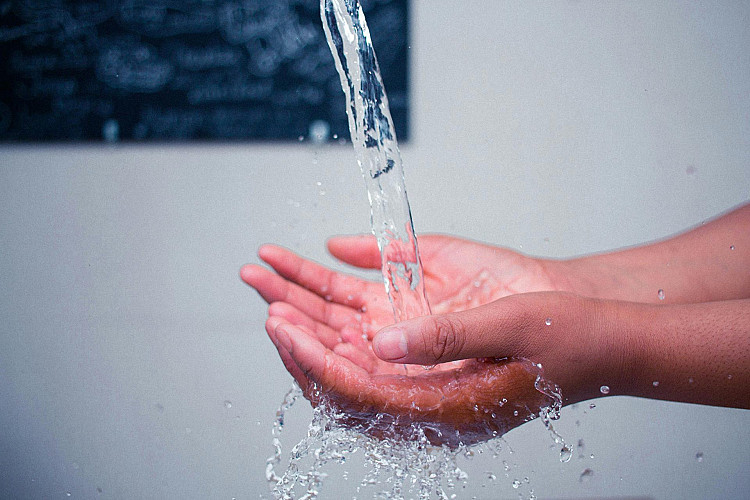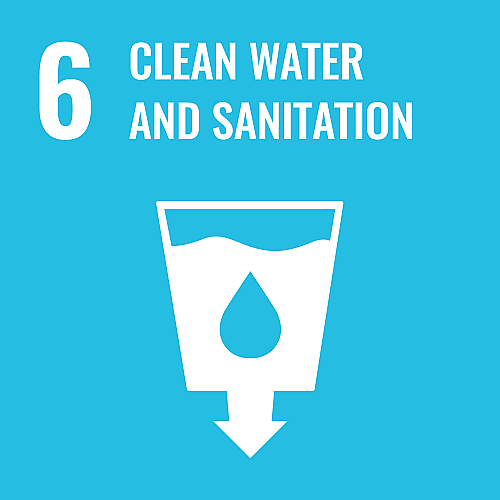Sustainability
MUBAS for Sustainable Development
Explore this section
SDG 6: Clean Water and Sanitation


Clean Water and Sanitation, aims to ensure availability and sustainable management of water and sanitation for all. It focuses on universal access to safe drinking water, adequate sanitation, improved water quality, efficient use, and protection of water-related ecosystems to support health and well-being.
Indicators
6.2.1 Water Consumption tracking
MUBAS monitors its total water consumption across all campuses, as detailed on the Water Usage and Conservation page. The data is used to plan water-saving and sustainability strategies. MUBAS is actively tracking and publishing water usage data to monitor patterns of consumption, identify areas of overuse or leakage, and raise awareness among students, staff and the broader community.
University Water Consumption Tracking
6.2.2.1 Volume of water used in the university.
The university consumed a total of 201,271,000 litres of inbound water (treated or extracted) to support campus operations. With an enrolled population of 10,385 students and staff, this translates to approximately 19,381 litres per person per year.
Volume of Water
6.2.2.2 Campus population.
The university has an enrollment population of 10,385 students and staff. This number represents individuals who study, work, and regularly utilize campus facilities and services
Total Campas population
6.3.1 Wastewater treatment.
The Malawi University of Business and Applied Sciences (MUBAS) participates in a wastewater-treatment system operated by Blantyre Water Board (BWB). The system includes the collection of both sanitary and combined sewage, which is conveyed to a dedicated treatment plant. There, the wastewater undergoes purification via trickling filters and oxidation ponds to remove contaminants and improve water quality before being discharged safely into nearby rivers
Wastewater Treatment and Management
6.3.2 Preventing Water system pollution.
MUBAS implements internal Water Conservation and Reuse Guidelines to control wastewater discharge and prevent contamination from laboratory and maintenance operations.
Water Pollution Prevention Measures
6.3.3 Free drinking water provided.
The Malawi University of Business and Applied Sciences (MUBAS) has implemented a system to provide free drinking water across its campus, available to students, staff, and visitors. The initiative is part of the university’s broader commitment to wellness and sustainability, recognising water as a basic necessity and a key element of ecological balance
Free Drinking Water
6.3.4 Water-conscious building standards.
Malawi University of Business and Applied Sciences (MUBAS) has embraced a building design strategy aimed at minimising water use across its campuses. According to its reported initiatives, MUBAS has implemented features such as low‑flow faucets, showers and toilets, drought‑resistant landscaping and soil‑moisture retention methods around its “water‑conscious” buildings to reduce irrigation and consumption
Water‑Efficient Building Standards & Design
6.3.5 Water-conscious planting.
MUBAS applies environmentally sustainable landscaping practices using drought-tolerant plants.
Water-Efficient Landscaping Practices
6.4.1 Water reuse policy.
The Malawi University of Business and Applied Sciences (MUBAS) has adopted comprehensive “Water Conservation and Reuse Guidelines” that set out a formal policy for maximising water reuse across its campuses. These guidelines define key terms (such as water reuse, greywater, and rainwater harvesting) and establish the purpose of supporting sustainable water management by promoting efficient use, reuse and conservation of water throughout the university.
Water Reuse and Recycling Guidlines
6.4.2 Water reuse measurement.
The Malawi University of Business and Applied Sciences (MUBAS) is actively engaged in monitoring the reuse of water on campus through its “innovative engineering project” aimed at water‑reuse practices. The institution tracks key metrics associated with reclaimed or recycled water flows, including volumes of treated grey‑water and non‑potable reuse streams, as part of its sustainable water management framework
Measurement of Water Reuse Across the University
6.5.1 Water management educational opportunities.
Through the WASH for Everyone (W4E) project, MUBAS provides sanitation and water management education to local communities, promoting hygiene and responsible water use.
Water Management Education
6.5.3 Off-campus water conservation support.
The SURG-Water Project promotes sustainable water practices in surrounding communities, encouraging conservation and reuse technologies.
Water Conservation Support off campus
6. 5. 4 Water Extraction Technologies
MUBAS has implemented a sustainable water-management system that captures rainwater and surface runoff, channels it into a storage dam, and treats it for reuse on campus. This innovative approach reduces dependence on external water sources and promotes environmentally responsible water use. The project demonstrates the university’s commitment to sustainable water technologies in managing its campus resources.
Water Reuse Through Innovative Engineering
6.5.5 Cooperation on water security.
Through the Water Security Workshop in Mangochi, MUBAS collaborates with government and development partners to address national water security and policy issues.
Coorperation on Water Security
6.5.6 Consicious Water Usage on Campus
MUBAS actively promotes conscious water usage on campus through awareness campaigns, water‑efficient fixtures, and rainwater‑harvesting initiatives. The university encourages students, staff, and visitors to adopt responsible water practices, supporting sustainable management of campus resources.
Water Usage practices
6.5.7 Promoting conscious water usage in the wider community.
MUBAS extends its sustainability advocacy to local communities through workshops and awareness campaigns on efficient and equitable water usage.
Conscious Water Usage
